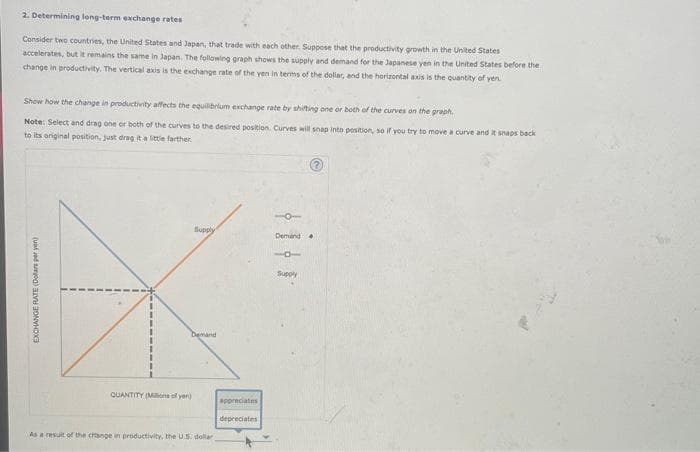2. Determining long-term exchange rates Consider two countries, the United States and Japan, that trade with each other. Suppose that the productivity growth in the United States accelerates, but it remains the same in Japan. The following graph shows the supply and demand for the Japanese yen in the United States before the change in productivity. The vertical axis is the exchange rate of the yen in terms of the dollar, and the horizontal axis is the quantity of yen. Show how the change in productivity affects the equilibrium exchange rate by shifting one or both of the curves on the graph Note: Select and drag one or both of the curves to the desired position. Curves will snap into position, so if you try to move a curve and it snaps back to its original position, just drag it a little farther EXCHANGE RATE (Dolars per ye Supply Demand QUANTITY (Mons of yen) As a result of the change in productivity, the U.S. dollar appreciates depreciates Demand 16 Supply
2. Determining long-term exchange rates Consider two countries, the United States and Japan, that trade with each other. Suppose that the productivity growth in the United States accelerates, but it remains the same in Japan. The following graph shows the supply and demand for the Japanese yen in the United States before the change in productivity. The vertical axis is the exchange rate of the yen in terms of the dollar, and the horizontal axis is the quantity of yen. Show how the change in productivity affects the equilibrium exchange rate by shifting one or both of the curves on the graph Note: Select and drag one or both of the curves to the desired position. Curves will snap into position, so if you try to move a curve and it snaps back to its original position, just drag it a little farther EXCHANGE RATE (Dolars per ye Supply Demand QUANTITY (Mons of yen) As a result of the change in productivity, the U.S. dollar appreciates depreciates Demand 16 Supply
Chapter20: International Finance
Section: Chapter Questions
Problem 2.3P
Related questions
Question

Transcribed Image Text:2. Determining long-term exchange rates
Consider two countries, the United States and Japan, that trade with each other. Suppose that the productivity growth in the United States
accelerates, but it remains the same in Japan. The following graph shows the supply and demand for the Japanese yen in the United States before the
change in productivity. The vertical axis is the exchange rate of the yen in terms of the doliar, and the horizontal axis is the quantity of yen.
Show how the change in productivity affects the equilibrium exchange rate by shifting one or both of the curves on the graph
Note: Select and drag one or both of the curves to the desired position. Curves will snap into position, so if you try to move a curve and it snaps back
to its original position, just drag it a little farther
EXCHANGE RATE (Dolars per yen
Supply
Demand
QUANTITY (Millions of yer)
As a result of the change in productivity, the U.S. dollar
appreciates
depreciates
Demand
Supply
Expert Solution
This question has been solved!
Explore an expertly crafted, step-by-step solution for a thorough understanding of key concepts.
This is a popular solution!
Trending now
This is a popular solution!
Step by step
Solved in 4 steps with 1 images

Knowledge Booster
Learn more about
Need a deep-dive on the concept behind this application? Look no further. Learn more about this topic, economics and related others by exploring similar questions and additional content below.Recommended textbooks for you


Principles of Economics, 7th Edition (MindTap Cou…
Economics
ISBN:
9781285165875
Author:
N. Gregory Mankiw
Publisher:
Cengage Learning

Principles of Macroeconomics (MindTap Course List)
Economics
ISBN:
9781285165912
Author:
N. Gregory Mankiw
Publisher:
Cengage Learning


Principles of Economics, 7th Edition (MindTap Cou…
Economics
ISBN:
9781285165875
Author:
N. Gregory Mankiw
Publisher:
Cengage Learning

Principles of Macroeconomics (MindTap Course List)
Economics
ISBN:
9781285165912
Author:
N. Gregory Mankiw
Publisher:
Cengage Learning

Brief Principles of Macroeconomics (MindTap Cours…
Economics
ISBN:
9781337091985
Author:
N. Gregory Mankiw
Publisher:
Cengage Learning

Principles of Economics 2e
Economics
ISBN:
9781947172364
Author:
Steven A. Greenlaw; David Shapiro
Publisher:
OpenStax

Principles of Economics (MindTap Course List)
Economics
ISBN:
9781305585126
Author:
N. Gregory Mankiw
Publisher:
Cengage Learning